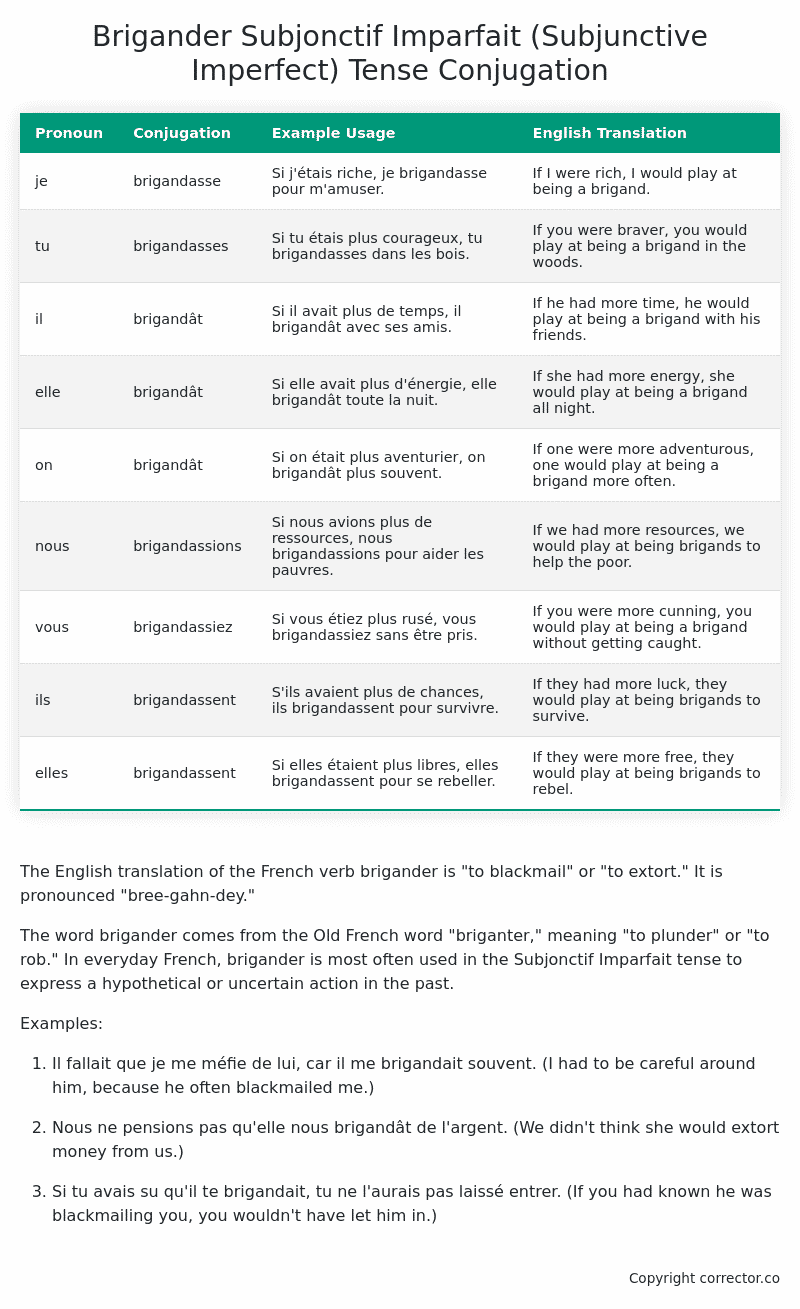Subjonctif Imparfait (Subjunctive Imperfect) Tense Conjugation of the French Verb brigander
Introduction to the verb brigander
The English translation of the French verb brigander is “to blackmail” or “to extort.” It is pronounced “bree-gahn-dey.”
The word brigander comes from the Old French word “briganter,” meaning “to plunder” or “to rob.” In everyday French, brigander is most often used in the Subjonctif Imparfait tense to express a hypothetical or uncertain action in the past.
Examples:
-
Il fallait que je me méfie de lui, car il me brigandait souvent. (I had to be careful around him, because he often blackmailed me.)
-
Nous ne pensions pas qu’elle nous brigandât de l’argent. (We didn’t think she would extort money from us.)
-
Si tu avais su qu’il te brigandait, tu ne l’aurais pas laissé entrer. (If you had known he was blackmailing you, you wouldn’t have let him in.)
Table of the Subjonctif Imparfait (Subjunctive Imperfect) Tense Conjugation of brigander
| Pronoun | Conjugation | Example Usage | English Translation |
|---|---|---|---|
| je | brigandasse | Si j’étais riche, je brigandasse pour m’amuser. | If I were rich, I would play at being a brigand. |
| tu | brigandasses | Si tu étais plus courageux, tu brigandasses dans les bois. | If you were braver, you would play at being a brigand in the woods. |
| il | brigandât | Si il avait plus de temps, il brigandât avec ses amis. | If he had more time, he would play at being a brigand with his friends. |
| elle | brigandât | Si elle avait plus d’énergie, elle brigandât toute la nuit. | If she had more energy, she would play at being a brigand all night. |
| on | brigandât | Si on était plus aventurier, on brigandât plus souvent. | If one were more adventurous, one would play at being a brigand more often. |
| nous | brigandassions | Si nous avions plus de ressources, nous brigandassions pour aider les pauvres. | If we had more resources, we would play at being brigands to help the poor. |
| vous | brigandassiez | Si vous étiez plus rusé, vous brigandassiez sans être pris. | If you were more cunning, you would play at being a brigand without getting caught. |
| ils | brigandassent | S’ils avaient plus de chances, ils brigandassent pour survivre. | If they had more luck, they would play at being brigands to survive. |
| elles | brigandassent | Si elles étaient plus libres, elles brigandassent pour se rebeller. | If they were more free, they would play at being brigands to rebel. |
Other Conjugations for Brigander.
Le Present (Present Tense) Conjugation of the French Verb brigander
Imparfait (Imperfect) Tense Conjugation of the French Verb brigander
Passé Simple (Simple Past) Tense Conjugation of the French Verb brigander
Passé Composé (Present Perfect) Tense Conjugation of the French Verb brigander
Futur Simple (Simple Future) Tense Conjugation of the French Verb brigander
Futur Proche (Near Future) Tense Conjugation of the French Verb brigander
Plus-que-parfait (Pluperfect) Tense Conjugation of the French Verb brigander
Passé Antérieur (Past Anterior) Tense Conjugation of the French Verb brigander
Futur Antérieur (Future Anterior) Tense Conjugation of the French Verb brigander
Subjonctif Présent (Subjunctive Present) Tense Conjugation of the French Verb brigander
Subjonctif Passé (Subjunctive Past) Tense Conjugation of the French Verb brigander
Subjonctif Imparfait (Subjunctive Imperfect) Tense Conjugation of the French Verb brigander (this article)
Subjonctif Plus-que-parfait (Subjunctive Pluperfect) Tense Conjugation of the French Verb brigander
Conditionnel Présent (Conditional Present) Tense Conjugation of the French Verb brigander
Conditionnel Passé (Conditional Past) Tense Conjugation of the French Verb brigander
L’impératif Présent (Imperative Present) Tense Conjugation of the French Verb brigander
L’infinitif Présent (Infinitive Present) Tense Conjugation of the French Verb brigander
Struggling with French verbs or the language in general? Why not use our free French Grammar Checker – no registration required!
Get a FREE Download Study Sheet of this Conjugation 🔥
Simply right click the image below, click “save image” and get your free reference for the brigander Subjonctif Imparfait tense conjugation!

Brigander – About the French Subjonctif Imparfait (Subjunctive Imperfect) Tense
Formation
Common Everyday Usage Patterns
Interactions with Other Tenses
Subjonctif Présent
Indicatif Passé Composé
Conditional
Conditional Perfect
Summary
I hope you enjoyed this article on the verb brigander. Still in a learning mood? Check out another TOTALLY random French verb conjugation!


